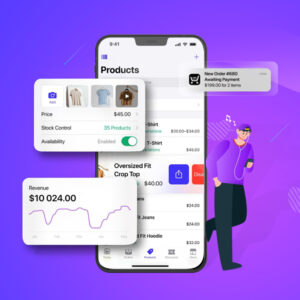The Evolution and Importance of Mobile App Development
In today’s digital age, mobile app development has become a cornerstone of technological advancement, bridging the gap between businesses and consumers. With the rapid growth of smartphones and tablets, mobile applications have evolved from simple tools to complex, multifunctional systems that can cater to almost every need. Whether for entertainment, productivity, social networking, or e-commerce, mobile apps have revolutionized the way we interact with technology.

The Evolution of Mobile App Development
The journey of mobile app development began with the advent of the first smartphones. Early apps were simple, focusing primarily on providing basic functions like calculators, calendars, and games. However, with the introduction of Apple’s App Store in 2008 and Google’s Android Market (now Google Play), the mobile app industry experienced explosive growth.
The introduction of these platforms allowed developers to create and distribute apps to a global audience, leading to an explosion in the number and variety of apps available. Over the years, mobile app development has evolved to include complex functionalities like augmented reality (AR), artificial intelligence (AI), and Internet of Things (IoT) integration. This evolution has enabled businesses to offer more personalized and interactive experiences to their users.
The Mobile App Development Process
Developing a mobile app is a multi-step process that involves a variety of skills and tools. Here’s a brief overview of the stages involved:
- Idea and Conceptualization: Every app starts with an idea. This stage involves brainstorming and defining the app’s purpose, target audience, and unique selling points.
- Research and Planning: Once the idea is clear, the next step is market research. This includes analyzing competitors, understanding user needs, and identifying market trends. Based on the research, a detailed plan is developed, outlining the app’s features, design, and technology stack.
- Design: The design phase focuses on creating the app’s user interface (UI) and user experience (UX). This involves creating wireframes, prototypes, and final designs that ensure the app is visually appealing and easy to navigate.
- Development: This is where the actual coding happens. Developers choose the appropriate platform (iOS, Android, or cross-platform) and programming languages (Swift, Kotlin, Flutter, etc.) to build the app. This phase includes both front-end and back-end development, ensuring that the app functions smoothly.
- Testing: Before an app is launched, it undergoes rigorous testing to identify and fix any bugs or issues. Testing ensures that the app performs well under various conditions and provides a seamless experience to users.
- Launch: Once the app is tested and polished, it’s ready for launch. The app is submitted to app stores, where it goes through a review process before becoming available to the public.
- Maintenance and Updates: Post-launch, the app requires regular updates and maintenance to fix any issues, add new features, and improve performance based on user feedback.
Importance of Mobile App Development
Mobile app development has become essential for businesses and organizations for several reasons:
- Enhanced Customer Engagement: Mobile apps provide a direct and personalized way for businesses to interact with their customers. Push notifications, in-app messaging, and personalized content help in maintaining constant engagement.
- Increased Brand Visibility: An app on a user’s smartphone keeps the brand in constant view, increasing visibility and brand recall.
- Accessibility: Apps make it easier for customers to access services or products anytime, anywhere, providing convenience and fostering loyalty.
- Revenue Generation: Mobile apps offer multiple revenue streams, such as in-app purchases, subscriptions, and ads, providing businesses with opportunities to monetize their offerings.
- Data Collection and Analysis: Apps enable businesses to collect valuable data on user behavior, preferences, and interactions, helping them make informed decisions and tailor their offerings.
The Future of Mobile App Development
The future of mobile app development looks promising, with advancements in technologies like 5G, AI, AR, and IoT. These technologies will enable developers to create more immersive and intelligent apps, enhancing user experience and expanding the possibilities of what apps can achieve.
Moreover, the demand for cross-platform development is expected to rise, with frameworks like Flutter and React Native allowing developers to create apps that work seamlessly across multiple platforms with a single codebase.
Conclusion
Mobile app development is a dynamic and rapidly evolving field that plays a crucial role in the modern digital landscape. As technology continues to advance, the opportunities for innovation in app development are limitless. For businesses, investing in a well-designed and functional mobile app is no longer an option but a necessity to stay competitive and meet the ever-growing demands of the digital-savvy consumer.